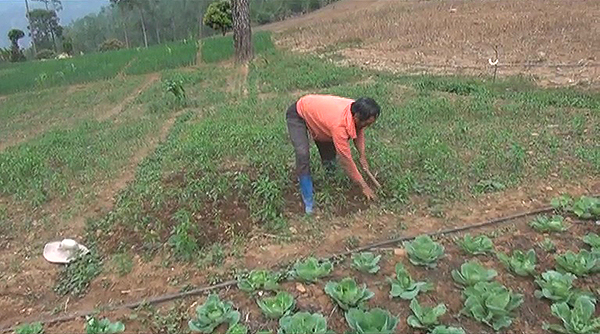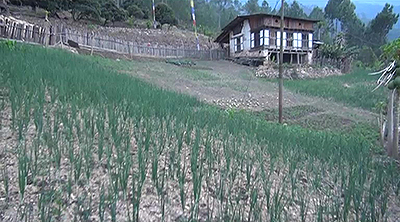 Increasing demand from customers for fresh and locally grown vegetables has pushed farmers of Kalapang village in Saling Gewog in Monggar to diversity further in crop cultivation.
Increasing demand from customers for fresh and locally grown vegetables has pushed farmers of Kalapang village in Saling Gewog in Monggar to diversity further in crop cultivation.
This time, they took up mass chilli, onion and tomato cultivation. Farmers in other gewogs have never tried this farming. Pema Wangdi, 63, is one of the farmers, who have been hell-bent in growing vegetables on commercial scale. He earned almost Nu 400,000 by selling vegetables such as cabbage, broccoli and cauliflower last year.
Realising that vegetables fetch higher returns, he is growing chillies, onions and tomatoes on his 4-acre farm this season. He is hoping to earn around Nu 200,000 by vending these vegetables.
Pema Wangdi told BBS News that his interest in vegetable farming became more visible after the government banned import of vegetables from other countries. He said earlier, farmers cultivated only maize for income. “We only got Nu 10 -12 for a kg of maize. But for a kg of vegetables, we fetch over Nu 30 to 50.
He added: “So now we grow maize for our own consumption and vegetables for commercial purposes. I am even planning to sell our crops in Nganglam town as HRH Gyaltshab and dzongkhag officials told me market is better there.”
Like Pema, other villagers are also growing chilies, onions and tomatoes on a large scale. But, they say shortage of irrigation water is the main obstacle to do farm business. “Without enough irrigation water, we cannot grow more vegetables. Otherwise, we have fertile soil to do vegetable farming,” said one of the farmers, Rinchen Wangmo.
Another farmer, Dorji also said: “If we have adequate water, we can cultivate a variety of vegetables and earn good income.”
Meanwhile, Monggar Dzongdag Ugyen Sonam said they are exploring ways to address the issue. Currently, farmers in Kalapang depend on rainwater for growing vegetables.







